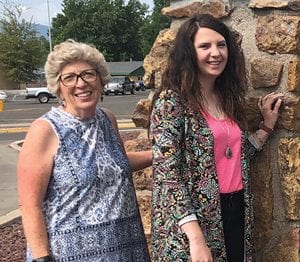Originally printed in the October 2018 issue of Produce Business.
Organic acreage increase continues, and good quality crop prevails as San Luis Valley potato volume hits the market.
Colorado’s scenery, climate and popularity as a tourist destination often overshadow some of its less obvious assets, such as its high-quality fresh potatoes. The San Luis Valley in southwestern Colorado provides a perfect locale for producing some of the best potatoes on the planet, which potato buyers are again welcoming into the market.
With more than 300 days of sunshine a year and grown at an elevation of 7,600 feet, Colorado’s San Luis Valley is situated between the San Juan and Sangre de Cristo mountain ranges, and is the highest and largest alpine valley in the world where commercial crops are grown.
Potatoes are planted in rich soil that contains unique mineral deposits, as the valley used to be a lakebed in the ancient past. Today, minerals are continuously deposited here from numerous mountain rivers, and the surrounding mountains provide a supply of pure mountain water from the annual snow melt. The altitude naturally decreases the likelihood of disease and pests, minimizing the need for pesticide use. This also makes the region more favorable for organic production.
Combine those features with a 2018 high-quality crop, which several growers have described as the best they’ve seen in 20 years, and buyers have been gifted with a promotable crop, which should enjoy steadily increasing volume as the shipping season progresses.
 Harvest and shipping was hitting full-stride by early October from 2018-planted acreage estimated to be “essentially the same as last season,” at about 52,000 acres, according to Jim Ehrlich, executive director of the Monte Vista, CO-based Colorado Potato Administrative Committee (CPAC). About 95 percent of the crop is shipped to fresh markets locally, nationally and internationally.
Harvest and shipping was hitting full-stride by early October from 2018-planted acreage estimated to be “essentially the same as last season,” at about 52,000 acres, according to Jim Ehrlich, executive director of the Monte Vista, CO-based Colorado Potato Administrative Committee (CPAC). About 95 percent of the crop is shipped to fresh markets locally, nationally and internationally.
FREIGHT ADVANTAGE, LOCAL BUYING TREND CONTINUES
Domestically, the San Luis Valley’s central location within the United States adds to the potatoes’ allure. It provides a natural freight advantage and becomes even more appealing with the continual popularity of locally grown.
One-stop potato shopping available through this single growing region can be another way to save on freight costs. “Colorado potatoes can be delivered to our customers in one or two days. Delivery can sometimes even be done overnight — to Dallas, for example,” emphasizes Jere Metz, salesman at Monte Vista, CO-based Farm Fresh Direct, which markets both conventional and organic potatoes year-round. “It makes them fresher and reduces shrink.”
ORGANICS INCREASE
Although organically grown potato acreage continues to comprise a growing percentage of the total, “the increase has leveled off a bit,” reports Ehrlich. Although CPAC does not have official data on organic acres, Ehrlich notes, “Colorado has an advantage because of reduced disease pressure and the lack of late blight, which other areas face.”
Two San Luis Valley-based companies joined the organic shipper list when they entered into a joint venture last season. Hi-Land Potato Co. and Monte Vista Potato Growers Co-op started packing organics in a packing facility north of Monte Vista.
“All shippers here are trying to do at least some organics,” notes Ehrlich. One grower-shipper, for example, Maverick Potato Co., based in Center, CO, completed the conversion of 100 percent of its potato crop into certified organic a few years ago.
 Maverick co-owner Roger Christensen reports organic production through his warehouse in 2018-19 will be about 40 percent in Russets, with 35 percent in gold varieties and 25 percent in Reds. Much of Maverick’s product is now marketed through Farm Fresh Direct, Monte Vista, CO. “Because of the seasonal nature of our product, this global marketing agency is a great asset,” he notes, adding that he only recently joined the Farm Fresh sales/business development team.
Maverick co-owner Roger Christensen reports organic production through his warehouse in 2018-19 will be about 40 percent in Russets, with 35 percent in gold varieties and 25 percent in Reds. Much of Maverick’s product is now marketed through Farm Fresh Direct, Monte Vista, CO. “Because of the seasonal nature of our product, this global marketing agency is a great asset,” he notes, adding that he only recently joined the Farm Fresh sales/business development team.
 Aspen Produce LLC, based in Center, CO, will be offering more organics this season, according to co-owner Rick Ellithorpe. The company completed installation of its certified organic packing line, and its growing operations increased its organic acreage. Aspen Produce’s organic volume is estimated to be at least 10 percent of total product shipped.
Aspen Produce LLC, based in Center, CO, will be offering more organics this season, according to co-owner Rick Ellithorpe. The company completed installation of its certified organic packing line, and its growing operations increased its organic acreage. Aspen Produce’s organic volume is estimated to be at least 10 percent of total product shipped.
 Skyline Potato Co., Center, CO, has been marketing organic potatoes for more than 20 years and has developed a wide customer base and loyal following. “We are a full-service potato company, with a year-round supply of potatoes — both conventional and organic,” says Les Alderete, Skyline’s general manager.
Skyline Potato Co., Center, CO, has been marketing organic potatoes for more than 20 years and has developed a wide customer base and loyal following. “We are a full-service potato company, with a year-round supply of potatoes — both conventional and organic,” says Les Alderete, Skyline’s general manager.
The company markets a portion of its organic volume through Robinson Fresh, Eden Prairie, MN, using the Tomorrow’s Organic label. At the same time, the company sells its own Nature Fresh organic label through Skyline. “There’s a big learning curve when you first get into organic growing, and not everyone will make it,” says Alderete.
Other shippers offering organics in their line include RPE Colorado, in Monte Vista, White Rock Specialties LLC in Mosca, and Canon Potato LLC in Center.
Whether organic or conventional, Russet varieties remain the primary potato shipped from this region. Overall, Red potato production has increased slightly, but Yellows have enjoyed an even greater jump, comprising more than 10 percent of production. Fingerlings and other specialty varieties account for about 3 percent, reports CPAC’s Ehrlich.
He hastens to add, however, that Colorado can grow any kind of potato that buyers or consumers desire. Pink-skinned potatoes, purple varieties and unusually shaped potatoes are getting the attention of a full range of end-users — from executive chefs to “foodies,” to creative home cooks seeking new, imaginative ideas for their families or for entertaining guests.
PACKAGING, BRANDING DRAW BUYER INTEREST
While private labeling continues to gain a greater market share, shippers in the San Luis Valley maintain recognition of their brands and packaging quality are points that set them apart from their competition. Aspen Produce features a label, which also emphasizes its appealing Colorado location. “I believe that smaller name brands will continue to emerge, similar to micro-breweries, for example,” explains Jed Ellithorpe, Aspen Produce co-owner. “We are a micro-shed. We’re smaller, but more special,” says Ellithorpe, adding, “We found that local branding does increase buying loyalty.”
Rick Ellithorpe uses Aspen Produce’s carton as an example. “We take our ‘Aspen’ logo very seriously. The ‘Aspen’ box is a little heavier cardboard, so it doesn’t move around as much on the pallet and is intact on arrival,” he explains. “There are customers that call us first when they want the best-quality cartons. We are also very careful about the accurate spud count within the cartons.”
As quality demand increases, interest in a variety of packaging sizes mirrors that trend. Jed Ellithorpe is seeing an increase in popularity of 5-pound packages, which some prefer more than the traditional, 10-pound option for Russets.
Skyline Potato’s Alderete agrees, predicting potato packaging options in the smaller sizes will persist in gaining popularity. He notes the shrink of packaging sizes coincides with the shifting buying habits of consumers — especially the “millennials,” whom he claims are opting for more convenience and are not buying the larger bags of potatoes. “You’ll see more of the smaller packaging — the 3- and 5-pound sizes — and smaller–sized potatoes.
“We are flexible and do whatever we can to meet our customers’ needs.” Alderete adds, “We also have a good following in Mexico and do a lot of custom packaging for customers there.”
Mexico is a major market for Colorado potatoes, which is limited to the 26-kilometer buffer zone at the border. The efforts to expand shipments beyond that buffer zone have been tied up in the courts for several years through lawsuits from the national potato-growing organization in Mexico.
Whether conventional or organic, in small consumer packs or in bulk, Colorado potatoes remain favorites among buyers — both locally and regionally. Ray Keegan, of Denver-based American Produce Co., services both foodservice and retail accounts. “Colorado potatoes are the best answer for my customers. They are fresher, they have more flavor and variety, and they are convenient and economical.”
WHAT’S NEW IN THE SAN LUIS VALLEY?
Farm Fresh Direct, Monte Vista, CO
Farm Fresh Direct, one of the largest U.S. potato growers and shippers, has added two potato-industry veterans to its sales team.
 Matt Glowczewski and Roger Christensen recently joined the company in sales management and sales/business development capacities. The two bring a collective 45 years in potato sales and production experience in the San Luis Valley. “With these additions, we intend to bolster existing sales and uncover new business opportunities and channels,” reports Jamey Higham, company president and chief executive.
Matt Glowczewski and Roger Christensen recently joined the company in sales management and sales/business development capacities. The two bring a collective 45 years in potato sales and production experience in the San Luis Valley. “With these additions, we intend to bolster existing sales and uncover new business opportunities and channels,” reports Jamey Higham, company president and chief executive.
Glowczewski brings 33 years of experience, including 20-plus years in the San Luis Valley. He most recently worked for RPE as a sales account manager. Prior to that, Glowczewski was a sales rep at Canon Potato Company in Center, CO, after starting in 1985 at Pueblo, CO-based Andrews Produce (now Andrews Food Service).
Christensen delivers 32 years of experience, including 22 in potato sales and production in the San Luis Valley. He presently operates 100-percent organic Maverick Potato Co. in Center, CO, which he will continue to do alongside his FFD responsibilities.
Before launching Maverick, Christensen was in general management and sales at Skyline Potato in Center. His produce career began at Salinas, CA-based Papazian Worldwide Distributing Inc., where he worked as a produce broker for 10 years.
“In his sales/business development role at FFD, Christensen looks forward to driving store-level potato sales through dynamic outlets such as assortment, merchandising and digital, particularly in the organic realm,” notes Higham.
Colorado Potato Administrative Committee (CPAC), Monte Vista, CO
New to CPAC but a familiar name in the San Luis Valley potato industry, Jessica Crowther recently joined the Colorado Potato Administrative Committee marketing staff. Crowther brings a lifelong connection to the San Luis Valley potato-growing region. Her late father, Ron, was a grower for Monte Vista Potato Growers, and her mother Lynette is that cooperative’s bookkeeper. With a bachelor’s degree in business administration and marketing from Adams State University in Alamosa, CO, Crowther was raised on a potato farm near Sargent, CO.
“Growing up on the farm, I know the industry from that perspective. I’m learning it from a different angle now at CPAC,” says Crowther.
Among her new duties, “I am working to keep up on our social media posts,” she says.
“I’m also hoping to bring a better understanding of what the farmers face. We want to share the story of our growers and how our high-quality potatoes get from farm to table.”
Maverick Potato Co., Center, CO
Entering its sixth year in business and its fourth year growing, packing and shipping exclusively organic potatoes, the company added another Volm bagger to its packing operation. “This has given us the capacity to handle more volume with greater efficiency, allowing us to pass on that increased value to our customers,” reports co-owner Roger Christensen. He also emphasizes the extra attention to detail and quality packing provided through Maverick’s plant manager, Tom Torrez. “He brought a lot of excellent fabrication skills to our packing shed.”
Aspen Produce LLC, Center, CO
With the completion last winter of its organic packing line, the company will be offering more volume in organics this season, according to co-owner Rick Ellithorpe. Aspen Produce also added management in the warehouse. Dennis Perrin will oversee the packing and distribution of the organic volume. “We are one of the few remaining independent shippers in the area that is not affiliated with a larger cooperative or corporate sales organization, which guarantees more personal attention to its customers,” says Ellithorpe. “We are different from other entities. We are quicker to react … most of our sales staff has seen, touched and maybe tasted what they are selling.”
Skyline Potato Co., Center, CO
Les Alderete, general manager of all operations, says the company expects to pack an increasing number of smaller packaging sizes, an ongoing trend he predicts will continue through the 2018-19 season. “Millennials and empty-nesters are two groups that go for the smaller consumer-size packs,” he notes.
Skyline Potato Co. offers conventional and organic product lines and operates two packing sheds in the Center, CO area. Potatoes are primarily marketed under the “Skyline” and “Green Giant” labels, but the company also does private labeling. “We cater to our customers and pack to their individual specifications,” stresses Alderete. “And our growers are some of the best in the Valley.”
Canon Potato Co., Center, CO.
 A well-known face in the potato industry, Dave Yeager has joined Canon Potato’s parent company, Springdale, AK-based Schmieding Produce, as senior vice president of business development. Yeager was vice president of business development for Monte Vista, CO-based Farm Fresh Direct for more than seven years before making the move to Schmieding. In his new role, he oversees sales of the company’s entire range of domestic and imported vegetables.
A well-known face in the potato industry, Dave Yeager has joined Canon Potato’s parent company, Springdale, AK-based Schmieding Produce, as senior vice president of business development. Yeager was vice president of business development for Monte Vista, CO-based Farm Fresh Direct for more than seven years before making the move to Schmieding. In his new role, he oversees sales of the company’s entire range of domestic and imported vegetables.
“It covers everything, including potatoes from Canon Potatoes in the San Luis Valley of Colorado,” notes Yeager.Yeager’s nearly 30 years in produce also include working as regional director with Chiquita, vice president of sales for Del Monte Fresh, vice president of sales for the Tippmann Group, and Eastern division manager for NewStar.
CPAC Activities
 A huge increase in Facebook hits and “likes” has proven measurable and yielding successful results for Monte Vista, CO-based Colorado Potato Administrative Committee (CPAC). With a ten-fold increase in “likes” and engagement in Facebook during the past year, CPAC’s marketing arm will continue using social media to get its message to consumers, according to Jessica Crowther, marketing administrative assistant for CPAC. A theme that cues in on the importance of potatoes in the diet for better performance is also being emphasized in the overall marketing plan. In her efforts to keep the participants engaged, Crowther creates new social media posts at least four times per week. Information ranges from new recipes to news from the potato industry.
A huge increase in Facebook hits and “likes” has proven measurable and yielding successful results for Monte Vista, CO-based Colorado Potato Administrative Committee (CPAC). With a ten-fold increase in “likes” and engagement in Facebook during the past year, CPAC’s marketing arm will continue using social media to get its message to consumers, according to Jessica Crowther, marketing administrative assistant for CPAC. A theme that cues in on the importance of potatoes in the diet for better performance is also being emphasized in the overall marketing plan. In her efforts to keep the participants engaged, Crowther creates new social media posts at least four times per week. Information ranges from new recipes to news from the potato industry.
The marketing plan will also encompass some TV advertising, including 15-second ads that focus on Colorado potatoes’ health benefits. This ties in with “Potatoes USA” (National Potato Promotion Board) and its overall theme “Potatoes Powering Performance.” The campaign has been designed to “show how potatoes can be helpful — not just for the professional athlete but also for the casual athlete,” explains Linda Weyers, CPAC assistant director.
Crowther notes CPAC’s promotions will also center on the concept of “Our farm feeding your family.”





